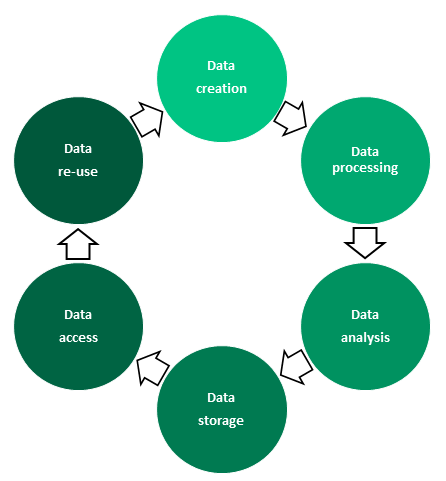Why Research Data Management?
The University of Bayreuth's Guidelines for Research Data Management

Phases of the Data Life Cycle modified from UK Data Archive (www.data-archive.ac.uk) and forschungsdaten.info (www.forschungsdaten.info).
Research data is data that can be collected, observed, simulated, derived, or generated. This includes measurements, laboratory results, audio-visual information, texts, survey data, objects from collections, samples, methodical test processes, surveys, and simulations.
Research data form the basis of our scientific enquiry and need to be handled responsibly. Throughout the research cycle - from gathering data to their publication to ensuring their long-term availability - research data should be treated and documented with care and according to current subject-specific standards.
Sustainable research data management includes the collection, saving, long-term storage, documentation, and publication of research data according to highest standards. The resulting reproducibility of the collection of the research data ensures their quality and opens up opportunities for future research.
For more information, please refer to the complete text of the Research Data Management Policy of the University of Bayreuth (published in November 2023) and our Guidelines for Research Data Management at the University of Bayreuth (published in June 2023).
Data Management for Researchers
Good organization of your own data facilitates your scholarly work, e.g. finding the data you are looking for (data inputs, analyses, and outputs at various stages in the analysis). The management of your data enables you to control your working processes and to reproduce and confirm analyses that have already been carried out (output input match). It thus allows for quality control of the data. You will gain an overview of the various versions of the data, you can identify irrelevant data and counter allegations of "sloppy science".
Advantages of data in repositories:
- Visibility of your data and your research
- Publication of data with DOI: data can be cited
- Direct linking to scientific publication
Societal Relevance
We live in the era of the "data deluge", which needs to be accessible and well-managed. Reproducibility of tests and analyses and the reusability of data are cornerstones of good scientific practice. Data has a high intrinsic value, it is costly, collecting it is time-consuming, and it must be stored securely. Neglecting data management results in additional costs, one of the reasons more and more funding providers are requiring data management plans.
Good data management guarantees:
- long-term access to the data for scientific replication and verification
- maximizing data capital via maximum exploitation (for individual data sets as well as by linking different data sets: identifying new, previously unknown relationships)
- improved data quality: precision, integrity, relevance, usefulness
- suitable repositories enable data to be reused in a constructive and appropriate way
- sustainability of the data.
Additional Information
- University of BayreuthHide
- Statements, position papers & guidelinesHide
-
Alliance of German Science Organisations
G8 Science Ministers Statement | June 2013 |

DFG
- Position paper "Förderung von Informationsinfrastrukturen für die Wissenschaft" | March 2018 |

- Online portal "Research Integrity" |

- "Guidelines on the Handling of Research Data" | September 2015 |

- Code of Conduct "Guidelines for Safeguarding Good Research Practice" | August 2019 |

Science Europe
- Position paper "Förderung von Informationsinfrastrukturen für die Wissenschaft" | March 2018 |
- FAIR principlesHide
-
GO FAIR Initiative
OpenAIRE
- CARE principlesHide
-
Global Indigenous Data Alliance (GIDA)
Should I CARE about FAIR? - Ein rechtlicher Blick auf die Prinzipien des Forschungsdatenmanagements |

- forschungsdaten.infoHide
-
forschungsdaten.info is an information portal dedicated to research data management (RDM). The English Pages offer different information for non-German-speaking researchers based in the German-speaking countries Germany, Austria or Switzerland. The pages focus on German particularities such as legal issues, funding, guidelines, policies and more.

